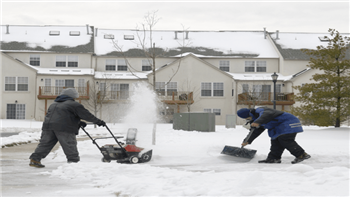What You Should Know About Accumulation of Snow and Ice
By: Howard S. Goldman

As we approach the upcoming New England Winter for 2010 and 2011, it is important for property owners and managers alike to keep abreast of the latest developments and trends in Massachusetts law to minimize the exposure to litigation from, primarily, slip and fall accidents from snow accumulation. This Client Update discusses the recent change in Massachusetts law on the duty of care of a property owner regarding snow and ice removal. It also provides a few pragmatic recommendations for a carefully worded Snow Removal Maintenance Agreement that can minimize legal exposure to the property owner.
Change in Massachusetts Law and Duty of Care
The traditional Massachusetts legal distinction with natural and unnatural accumulation snow and ice was recently abolished Massachusetts highest court. In the past, property owners were not negligent if they failed to remove a natural accumulation of ice and snow, and were negligent if they failed to remove an unnatural accumulation of ice and snow. This however changed with a recent decision from the Massachusetts highest court.
In the recent Supreme Judicial Court decision of Papadopoulos v. Target Corporation, (2010), the state’s high Court abolished the distinction between natural and unnatural accumulation of snow and ice, and applied to all hazards arising from snow and ice the same obligation of reasonable care that a property owner owes to lawful visitors regarding all hazards. In Target, the plaintiff, on his way back to his car after the purchase, slipped on a piece of ice that had frozen to the pavement. The ice on which plaintiff tripped either had fallen from the snow piled on the road median or had formed when snow melted and ran off the snow pile stacked by the snow plower, and then re-froze to the parking lot pavement. The Supreme Judicial Court in Target, in discarding the distinction between natural and unnatural accumulations of snow and ice, stated that such distinction was an exception to the general rule of premises liability that a property owner owes a duty to all lawful visitors to use reasonable care to maintain its property in a reasonably safe condition in view of all of the circumstances.
A property owner can no longer rely upon the past explanation defense that a snow or ice condition was open or obvious and that warning signs were duly posted. Now, the property owner’s duty to act as a reasonable person to maintain its property in a reasonably safe condition is balanced with relevant circumstances such as:
● likelihood of injury to others
● probable seriousness of such injuries
● burden of reducing or avoiding the risk, such as cost to landowner
● landowner is not an insurer of its property
● nor does the case impose unreasonable maintenance burdens
● amount of anticipated foot traffic
● correct maintenance and procedures, including correct 0perating gutters and downspouts and walkways, parking lot access ways or dumpsters cleared and not blocked by snow or ice
Contractual Protection
A properly worded Snow Removal Maintenance Agreement with a snow removal company can go a long way to minimizing the risk of exposure to property owners. Your Snow Removal Agreement should touch upon the following areas:
● make sure the snow removal company has adequate liability insurance and names the property owner as an additional insured
● stake the entire property to designate limits to paved areas including driveways, sidewalks, fire alarm stations and mailboxes.
● designate the number, location and maintenance of sandboxes
● mandate that there must be sanding or salt under all slippery conditions
● clearly identify what constitutes a storm that requires mitigation measures
● set limits to the height of permissible snow banks
● include a hold harmless clause that tracks the same language in the Target case, meaning that the snow removal company will indemnify and hold the property owner and/or the property manager harmless for any liability arising from the failure of the snow removal contractor’s failure to use reasonable care to maintain the property in a reasonably safe condition from snow and ice accumulation.
Summary
Therefore, while an owner of a single family home, large condominium, a store owner, and a nursing home operator each owe lawful visitors to their property a duty of reasonable care to keep its property reasonably safe, what constitutes reasonable snow removal will vary among them. You cannot prevent people from suing once they slip and fall on your property. However, if you follow the steps set forth above, you should be able to mount a successful defense by proving that the accident was caused by neither negligence nor a breach of a contractual duty, and make sure all claims are timely reported, in writing, to your insurance agent.
The Massachusetts real estate litigation lawyers at Goldman & Pease specialize in commercial and residential real estate legal matters and serve the greater Boston metro region including Alston, Arlington, Belmont, Brighton, Brookline, Cambridge, Canton, Dedham, Dover, Milton, Natick, Needham, Newton, Norwood, Waltham, Watertown, Wayland, Wellesley, Weston, West Roxbury, Westwood, and all of Massachusetts.

